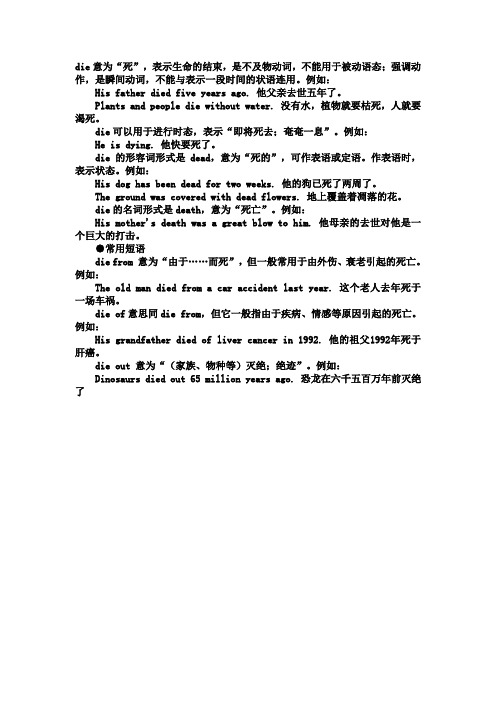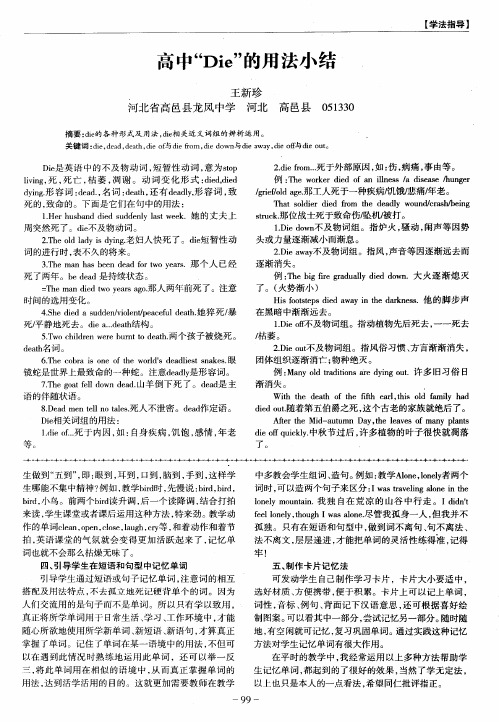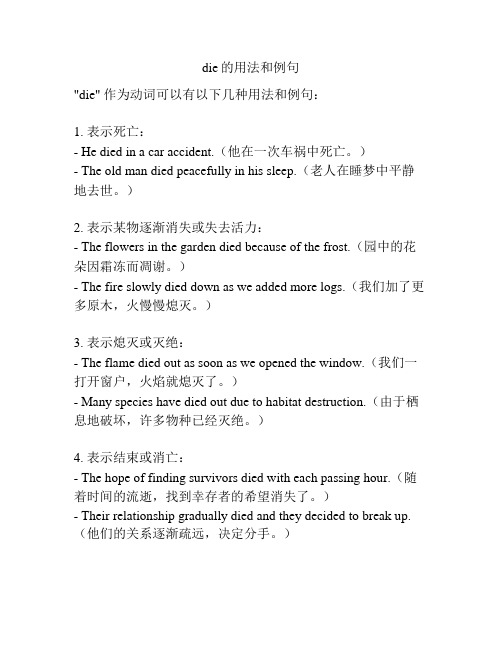die用法小结
- 格式:doc
- 大小:21.00 KB
- 文档页数:1

die的常见短语搭配归纳1.diefrom死于……,因……而死。
如:Hediedfromaheartattack.他死于心脏病发作。
Manyvillagersdieeveryyearfromsnakebites.每年都有许多村民死因被蛇咬而死亡。
2.dieof死于……,因……而死。
如:Hergrandfatherdiedofcancer.他祖父死于癌症。
Theanimalsdiedofstarvationinthesnow.这些动物在雪地里饿死了。
注:关于diefrom与dieof的区别:有人认为若死因存在于人体之上或之内,一般用介词of;若死因不是存在人体之内或之上,而是由环境造成的,则一般用介词from。
但在现代英语中两者常可混用。
4.bedyingforsth[todosth]迫切想要(做)某事。
如:Heisdyingforsomethingtoeat.他极想弄点东西吃。
Sheisdyingtoknowwherehehasgone.他迫切想知道他到哪里去了。
5.dieaway(声音、风、光线等)渐息,渐弱。
如:声音、风、光线等THebreezehasdiedaway.微风渐渐止住了。
Thesoundofthecardiedawayinthedistance.汽车的响声消失在远处。
6.diedown(慢慢)熄灭,平静下来。
如:Thefiredieddown.火慢慢熄了。
Hisangerhasdieddownabit.他的怒气已消了一点7.dieoff一个一个地死去die(=dieonebyone)。
如:Ashegrewolder,hisrelativesalldiedoff.随着他年龄的增长,他的亲人都一个一个地死去了。
8.dieout(家族、种族、习俗、观念等)灭绝,绝迹。
如:Manyoldcustomsaredyingout.许多旧习俗正在消失。

die的用法die有死;枯竭;消失;渴望等意思,那么你知道die的用法吗?下面跟着小编一起来学习一下,希望对大家的学习有所帮助!die的用法大全:die的用法1:die的基本意思是指动植物因生命终止而死亡。
引申可表示消失,停止运行枯萎等。
die的用法2:die主要用作不及物动词,也可用作系动词,接名词或形容词作表语,表示死时的身份或状态。
die有时也可用作及物动词,但必须接同源名词death作宾语, death前常可有形容词修饰。
die 不用于被动结构。
die的用法3:die和副词小品词连用可组成短语如die away, die down, die out,均表示由大到小,由近到远,由有到无,指灯光、火光、声音等逐渐消失。
die的用法4:die后接介词可组成短语表示死于某种原因。
如接介词from表示死于非命等,接of表示因疾病或年老等而死亡。
die的用法5:在口语中, die往往作渴望、切望或强烈地感受到解,表示一种极度状态,此时用现在进行时,其后可接介词for〔of, to〕或动词不定式。
die的用法6:die偶尔可用于进行体,表示就要死去,渐渐死去。
die的用法7:die的现在分词dying可用作形容词,在句中作定语。
die的用法例句:1. He won his first Derby on the aptly named Never Say Die.他驾驭着这匹名副其实的永不言败夺得了他的第一个德比马赛冠军。
2. You stay here, you die. No two ways about it.你若留在这里,必死无疑。
3. A new study proved conclusively that smokers die younger than non-smokers.一项新的研究确证了吸烟者比不吸烟者死得早。
4. Lung cells die and are replaced about once a week.肺细胞约每周新老更替一次。

die意为“死”,表示生命的结束,是不及物动词,不能用于被动语态;强调动作,是瞬间动词,不能与表示一段时间的状语连用。
例如:His father died five years ago. 他父亲去世五年了。
Plants and people die without water. 没有水,植物就要枯死,人就要渴死。
die可以用于进行时态,表示“即将死去;奄奄一息”。
例如:He is dying. 他快要死了。
die 的形容词形式是dead,意为“死的”,可作表语或定语。
作表语时,表示状态。
例如:His dog has been dead for two weeks. 他的狗已死了两周了。
The ground was covered with dead flowers. 地上覆盖着凋落的花。
die的名词形式是death,意为“死亡”。
例如:His mother's death was a great blow to him. 他母亲的去世对他是一个巨大的打击。
●常用短语die from 意为“由于……而死”,但一般常用于由外伤、衰老引起的死亡。
例如:The old man died from a car accident last year. 这个老人去年死于一场车祸。
die of意思同die from,但它一般指由于疾病、情感等原因引起的死亡。
例如:His grandfather died of liver cancer in 1992. 他的祖父1992年死于肝癌。
die out 意为“(家族、物种等)灭绝;绝迹”。
例如:Dinosaurs died out 65 million years ago. 恐龙在六千五百万年前灭绝了。


die的用法和例句
"die" 作为动词可以有以下几种用法和例句:
1. 表示死亡:
- He died in a car accident.(他在一次车祸中死亡。
)
- The old man died peacefully in his sleep.(老人在睡梦中平静地去世。
)
2. 表示某物逐渐消失或失去活力:
- The flowers in the garden died because of the frost.(园中的花朵因霜冻而凋谢。
)
- The fire slowly died down as we added more logs.(我们加了更多原木,火慢慢熄灭。
)
3. 表示熄灭或灭绝:
- The flame died out as soon as we opened the window.(我们一打开窗户,火焰就熄灭了。
)
- Many species have died out due to habitat destruction.(由于栖息地破坏,许多物种已经灭绝。
)
4. 表示结束或消亡:
- The hope of finding survivors died with each passing hour.(随着时间的流逝,找到幸存者的希望消失了。
)
- Their relationship gradually died and they decided to break up.(他们的关系逐渐疏远,决定分手。
)
注意:以上是“die” 作为动词的常见用法和相应例句,但这个词还有其他用法,具体根据句子上下文和语境可能有所不同。

die 的用法口诀一、什么是"die"?"Die"(发音为/daɪ/)是一个英语单词,是动词"dye"的过去式和过去分词形式。
它具有多种用法,可以表示颜色的染色、生物的死亡以及事物的消失。
二、表示颜色上的染色1. "die" 可以指代对物体进行染色。
比如在纺织工艺中,我们需要将棉花或羊毛等原料上色,就可以使用"dye"来表达这个意思。
例如:"I dyed my white T-shirt green."(我把我的白色T恤涂成了绿色。
)2. "die" 还可以用于描绘头发染色。
当我们想要改变自己的发型颜色时,我们可以使用这个词汇。
例如:"She decided to dye her hair blonde for the summer."(她决定在夏天把头发染成金黄色。
)三、描述生物死亡1. 当我们谈论到生命结束时,"die" 是一个常用的词汇。
无论是植物还是动物,都可以用这个动词来描述它们停止了生命活动。
例如:"The old tree died after years of providing shade in the park."(那棵老树在为公园提供了多年的遮荫后死去了。
)2. 当我们谈论到人类的死亡时,通常也会使用"die"来表达这个概念。
例如:"He died peacefully in his sleep."(他在睡梦中平静地去世了。
)四、事物消失或终止1. "die" 还可以用来描述某种状态或情况的结束或消失。
例如:"The music gradually died down as the concert came to an end."(随着音乐会的结束,音乐逐渐停止了。
die用法小结die意为“死”,表示生命的结束,是不及物动词,不能用于被动语态;强调动作,是瞬间动词,不能与表示一段时间的状语连用。
例如:His father died five years ago. 他父亲去世五年了。
Plants and people die without water. 没有水,植物就要枯死,人就要渴死。
die可以用于进行时态,表示“即将死去;奄奄一息”。
例如:He is dying. 他快要死了。
die 的形容词形式是dead,意为“死的”,可作表语或定语。
作表语时,表示状态。
例如:His dog has been dead for two weeks. 他的狗已死了两周了。
The ground was covered with dead flowers. 地上覆盖着凋落的花。
die的名词形式是death,意为“死亡”。
例如:His mother's death was a great blow to him. 他母亲的去世对他是一个巨大的打击。
●常用短语die from 意为“由于……而死”,但一般常用于由外伤、衰老引起的死亡。
例如:The old man died from a car accident last year. 这个老人去年死于一场车祸。
die of意思同die from,但它一般指由于疾病、情感等原因引起的死亡。
例如:His grandfather died of liver cancer in 1992. 他的祖父1992年死于肝癌。
die out 意为“(家族、物种等)灭绝;绝迹”。
例如:Dinosaurs died out 65 million years ago. 恐龙在六千五百万年前灭绝了。
使用动词die的注意事项
动词die的基本意思是离开人世、消失,在使用时有需要注意的几点:1.离开人士
Uncle Tom died.
汤姆叔叔去世了。
2.弥留之际
die的现在分词做形容词使用,表示弥留的。
There lies a dying man on the floor.
地上躺着一个弥留的人。
3.已故人士
dead是形容词性,表示已故的,可做定语修饰名词也可以作表语。
The dead writer left his readers a lot of works.
这位已故的作家给他的读者留下了许多著作。
4.完成时态
完成时态里,过去分词died不能接一段时间
Grandpa Jim has died.
吉姆爷爷已经去世了。
Grandpa Jim has been dead for five years.
吉姆爷爷已经去世5年了。
5.相关短语
die of 因内部因素去世
The singer died of heart attack.
这位歌手因心脏病去世。
die from 因外部因素去世
His grandma died from murder.
他的奶奶因谋杀去世。
die out 灭绝
More and more animals are dying out.
越来越多的动物正在灭绝。
die off 陆续死亡
Members in its family died off recently.
最近它族群里的成员陆续死亡。
die短语用法总结1. "die down":指噪音、情绪、活动等逐渐减弱或平息,例如:"The noise from the street eventually died down, allowing us to sleep."2. "to die for":形容某事物极其吸引人或美味至极,如:"This chocolate cake is simply 'to die for'!"3. "die hard":形容旧习惯、信仰或立场难以改变,比如:"He's adie-hard fan of classical music and refuses to listen to anything else."4. "kick the bucket":俚语,意为死亡,例如:"Despite his illness, he didn't kick the bucket until he was 95 years old."5. "die out":指物种灭绝或者风俗、观念等消失,例如:"Many ancient traditions have died out over time."6. "die laughing":形容因极度好笑而几乎昏厥,如:"I almost died laughing when I heard that joke."7. "cross the line" 或"draw one's last breath":均表示死亡,例如:"She drew her last breath peacefully in her sleep."8. "die off":群体中的成员相继死去,如:"With no food available, the birds began to die off rapidly."9. "die away":声音、光线、风等逐渐变弱直至消失,例如:"As the sun set, the light gradually died away."10. "die young":年纪轻轻就去世,例如:"Unfortunately, he had so much potential but died young at the age of 30."11. "die of":死于(某种疾病或情感原因),例如:"She died of a brokenheart after losing her husband."12. "die with":随…一起死亡,例如:"She died with her dreams unfulfilled."13. "die game":勇敢地面对死亡,不屈不挠,例如:"The soldier died game, fighting till the very end."14. "die by the sword":通过暴力手段丧生,或者倡导暴力者自己会死于暴力,例如:"Those who live by the sword often die by the sword."15. "die off the vine":比喻生命力迅速衰退,如:"Without proper care, the plants started to die off the vine."16. "die in harness":在工作岗位上逝世,即“鞠躬尽瘁”,例如:"The teacher died in harness, still dedicated to his students until his last day."17. "not able to die happy":不能安心离世,有未了心愿,例如:"After losing everything, he wasn't able to die happy."18. "the day you die":用于强调随时可能发生的情况,例如:"You never know what life will throw at you - it could happen on the day you die."19. "nothing ventured, nothing gained" 类似的短语"you miss 100of the shots you don't take",可引申出"die trying",意为全力以赴,即使失败也无怨无悔,例如:"We may not succeed, but we'll die trying."20. "a fate worse than death":描述一种极其痛苦或无法忍受的境遇,例如:"For her, living without him would be a fate worse than death."。
这些不定代词不仅在含义上有单复数之分,而且在用法上有泛指(无the)和特指(有the)之别。
其用法区别可归纳如下:
1. 指单数时的用法指单数时,若泛指用another,若特指用the other。
如:Give me another (one). 另外给我一个。
Shut the other eye, please. 请把另一只眼睛也闭上。
2. 指复数时的用法指复数时,若泛指用other(后接复数名词),若特指用the other(后接复数名词)。
如:There are other ways of doing it. 做这事还有其他的办法。
Where have the other students gone? 其他学生都到哪里去了?
3. other的用法others永远表示复数意义(且其后不能再接名词)。
其用法大致相当
于)“other+复数名词”,同样地the others 大致相当于“the other+复数名词”。
如:Other people [Others] may not think that way. 别的人可能不这样想。
He is cleverer than the others [the other students] in his class. 他比班上其他学生聪明。
4. another的用法another一般只能表单数,且其后接名词也只能接单数名词。
但是若其后有数词或few 修饰时,则也可接复数名词。
如:We need another few chairs. 我们还需要几把椅子。
In another two weeks it'll be finished. 再过两个星期就可做完了。
5. 与some连用与some 对比使用时,用others(此时与some 同义)。
如:Some say yes, and others say no. 有人说对,有人说不对。
Dinosaurs died out 65 million years ago. 恐龙在六千五百万年前灭绝了。